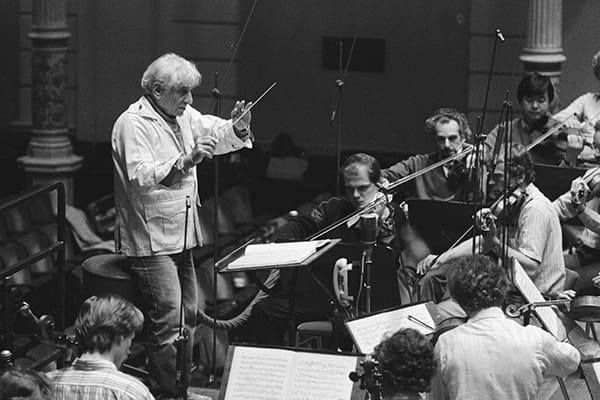
Leonard Bernstein was a massively successful figure in classical music. Born in 1918, he died of complications from mesothelioma in 1991.
During his career, Bernstein composed the Broadway musical West Side Story, conducted the New York Philharmonic and made composer Gustav Mahler a household name. He received multiple Grammy, Emmy and Tony Awards and a Kennedy Center Honor for his work.
Leonard Bernstein’s Cause of Death
At age 72, Leonard Bernstein died of a heart attack connected to his struggle with mesothelioma. Mesothelioma is a rare form of cancer that develops in tissue linings — usually the ones around the lungs or abdomen. It is not the same as lung cancer, which affects the lungs themselves.
At his time of death, Bernstein also faced other health struggles. In a New York Times article published soon after his death, his physician noted that emphysema and a series of lung infections also contributed to his passing.
Many factors shape a patient’s experience with mesothelioma, including overall health. Poor health may limit the treatments a patient is eligible to receive. Pre-existing conditions may also make health problems worse in mesothelioma patients.
Leonard Bernstein’s Risk Factors: Smoking and Alcohol
That Leonard Bernstein smoked and struggled with alcohol addiction is well known. Both habits may have contributed to his mesothelioma. Although people only develop mesothelioma after asbestos exposure, smoking and drinking may increase the risk of the disease developing after being exposed to asbestos.
Leonard Bernstein was a lifelong smoker, despite having asthma since his infancy. This habit resulted in serious health problems. He developed emphysema in his fifties and suffered from bronchitis.
His lung problems did not dissuade him from smoking. Colleagues and fans alike expressed concern over his smoking in his later years. But even when he needed a respirator to help him breathe, he continued to smoke.
Bernstein also battled alcoholism for much of his life, compulsively drinking scotch at all hours. Alcohol can weaken the immune system and leave a person more susceptible to cancer.
In his sixties, he developed another addiction to painkillers as his pulmonary symptoms worsened. A patient’s overall health is an important factor during cancer treatment and recovery. Alcohol use, smoking and long-term opioid use in cancer patients can all worsen outcomes.
Another Possible Risk Factor: Stress
Mental health and physical health are connected. Researchers have found links between stress hormones and cancer growth. As with his substance use, Bernstein’s stress may have further complicated his illnesses.
In addition to navigating a high-profile career in music, Bernstein faced stress at home. He married actress Felicia Montealegre and had several children with her. At the same time, he had affairs with men. But few American musicians were openly gay or bisexual at the time.
One friend of Bernstein’s relayed that the composer considered his sexuality to be a “curse.” Bernstein even sought out the help of a psychoanalyst, Dr. Sandor Rado, who was known for “curing” homosexuality.
Remembering and Honoring Leonard Bernstein’s Legacy
Leonard Bernstein was among the most famous and influential conductors of the 20th century. As a conductor, composer, pianist and author, he left an indelible mark on American classical music and the American stage.
Bernstein continued to work for as long as his illnesses allowed. Mesothelioma cut short a career he appeared to have no interest in giving up.
If you or someone you know is battling mesothelioma, there are treatment options available. For inspiration, check out these survivor stories.
And if you or someone you know is struggling with addiction, call SAMHSA’s National Helpline at 1 (800) 662-4357.




